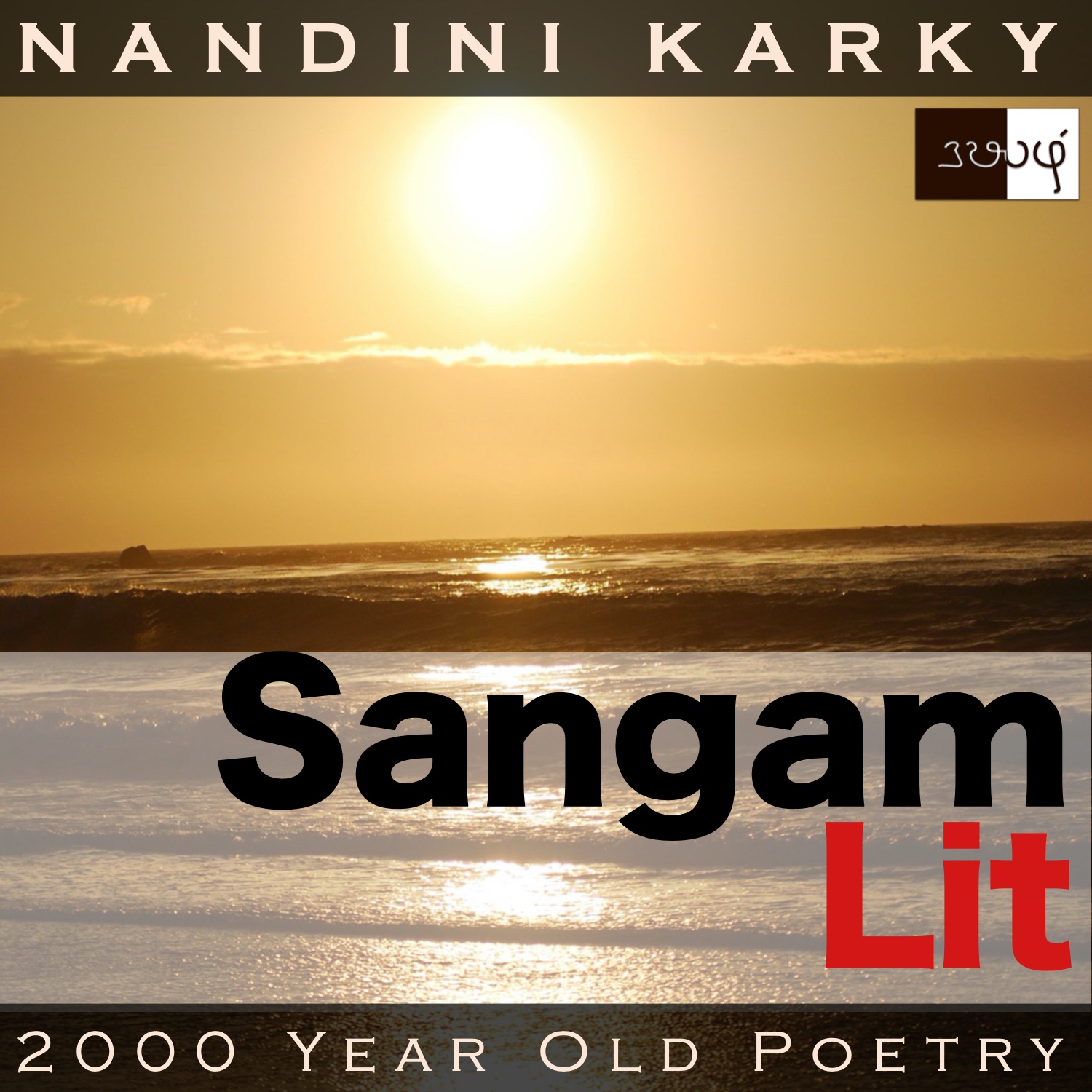Podcast: Play in new window | Download
Subscribe: Apple Podcasts | Spotify | Amazon Music | Android | iHeartRadio | TuneIn | RSS | More

In this episode, we observe how words are used to say one thing and mean another, as depicted in Sangam Literary work, Natrinai 215, penned by Madurai Chullam Pothanaar. The verse is set in the coastal regions of ‘Neythal’ and speaks in the voice of the confidante to the man, as he prepares to leave after trysting with the lady by day.
குண கடல் இவர்ந்து, குரூஉக் கதிர் பரப்பி,
பகல் கெழு செல்வன் குடமலை மறைய,
புலம்பு வந்து இறுத்த புன்கண் மாலை,
இலங்கு வளை மகளிர் வியல் நகர் அயர,
மீன் நிணம் தொகுத்த ஊன் நெய் ஒண் சுடர்
நீல் நிறப் பரப்பில் தயங்கு திரை உதைப்ப;
கரை சேர்பு இருந்த கல்லென் பாக்கத்து,
இன்று நீ இவணை ஆகி, எம்மொடு
தங்கின் எவனோதெய்ய? செங்கால்
கொடு முடி அவ் வலை பரியப் போகிய
கோட் சுறாக் குறித்த முன்பொடு
வேட்டம் வாயாது எமர் வாரலரே.
The poem opens with the words ‘குண கடல்’ meaning ‘eastern seas’, marking the ascent of the ‘பகல் கெழு செல்வன்’ or ‘creator of day’, the sun, and also, its descent into the ‘குடமலை’ or ‘western mountains’. From this description, we understand this is a shore on the eastern coast of Tamilnadu, perhaps even, a place close to Chennai, where I live. The oft-repeated phrase ‘புன்கண் மாலை’ describing ‘a suffering-filled evening’ makes its appearance again. Dusk does seem a difficult time to be alone. Perhaps, we can understand this feeling by equating it to our own need to seek the company and comfort of another when the day’s work is done and the sun fades away. The phrase ‘மீன் நிணம் தொகுத்த ஊன் நெய் ஒண் சுடர்’ portrays once again, how oil, which is made by melting fish fat, was used to light up lamps in Sangam homes by the sea. The crux of the verse lies in the loaded question ‘எம்மொடு தங்கின் எவனோதெய்ய’, which means ‘what could be wrong if you stay with us here?’ The verse finishes with the words ‘வேட்டம் வாயாது எமர் வாரலரே’ meaning ‘unless the hunt is done, our kin will not return’. Let’s move from these glimpses to the full picture.
The man and lady had been in a love relationship and the man had been trysting with her by day. When evening comes, he would part away to his town. One day, as he prepares to leave the lady after the day’s tryst, the confidante tells him, “Rising from the eastern seas, spreading crimson rays, the illustrious sun, the creator of day, descends behind the western mountains. In this sorrowful evening, wherein loneliness resides, maidens with shining bangles light up radiant flames on oil, made by melting fish fat, and welcome guests, who arrive to their wide mansions. As the swaying waves in the blue expanse caresses the sand, why don’t you remain here today in this uproarious hamlet near the shore, and stay with her? What could be wrong in that? A fierce shark has torn away the tightly knotted net held together by red stems. Unless they capture that marked shark and see success in their hunt, our strong kin will not return!” With these words, the confidante is showing the man that the only way to make his happiness last is to seek the lady’s hand in marriage.
The confidante is simply talking about the man staying the night but how then does she hide her intention of moving the man in the direction of a formal union? A closer look at the details and the dynamics will reveal how. After describing the journey of the sun from east to west, the confidante highlights how it’s a sorrow-filled evening for the lady, as the man leaves her to languish in loneliness. Saying this, she brings the contrasting image of bangled women welcoming guests in their home, giving a glimpse of a happy married life. Then, she turns to him and asks what could be wrong if instead of leaving, he chose to stay in their hamlet, for the night. As if reassuring him, she adds that the lady’s kith and kin, out on a hunt of a shark that has escaped the net, would not return until the shark is caught.
The invitation and assurance to the man does seem positive and welcoming. But, we have to understand how society worked then. It was not an acceptable custom for the man to stay the night in the lady’s home, unless their union had been formalised. So, although the confidante says ‘stay’ she means ‘You can’t! For that, you have to marry her.’ And, when she’s offering those reassuring words about the kith and kin being away, she actually encases within those words the truth about what a fierce lot they are and how they have immense strength to capture the shark that has escaped their net. A subtle threat to the man that the same kith and kin would come after him, if he kept slipping away from his duty of seeking their blessing for marrying the lady. Thus, what seems an invitation turns out to be rejection and what was an assurance, encases within, a warning. Herein lies a curious demonstration of the strangest aspect of quantum mechanics, showing that words can exist in two different states at the same time!




Share your thoughts...